By Leen Randell
Updated: Jul 04, 2024
10 Best Herbal Decoctions For Inflammatory Bowel Disease
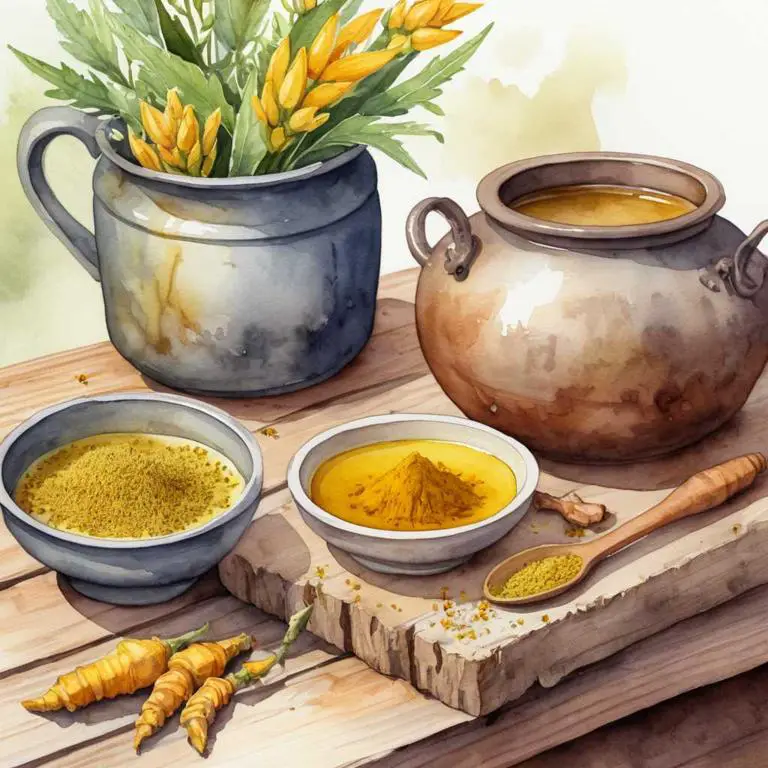
Herbal decoctions for inflammatory bowel disease are concentrated liquids made by steeping herbs in hot water, which have been traditionally used to alleviate symptoms of conditions such as Crohn's disease and ulcerative colitis.
These herbal decoctions help by reducing inflammation, soothing the gut lining, and improving digestion, thereby improving quality of life. For example, turmeric-based decoctions reduce inflammation, while slippery elm decoctions soothe the mucous membranes.
Improved symptoms allow individuals to enjoy daily activities without worrying about frequent bathroom trips or abdominal pain, leading to increased confidence and overall well-being.
The following article describes in detail the most important decoctions for inflammatory bowel disease, including medicinal properties, parts of herbs to use, and recipes for preparations.
- 1. Curcuma longa
- 2. Zingiber officinale
- 3. Ulmus rubra
- 4. Glycyrrhiza glabra
- 5. Althaea officinalis
- 6. Boswellia serrata
- 7. Mentha x piperita
- 8. Ginkgo biloba
- 9. Taraxacum officinale
- 10. Aloe vera
- What is the best combination of herbal decoctions to use for inflammatory bowel disease?
- What ailments similar to inflammatory bowel disease are treated with herbal decoctions?
1. Curcuma longa
Turmeric decoctions helps with inflammatory bowel disease because of its potent anti-inflammatory compound, curcumin.
This natural substance reduces inflammation in the digestive tract by inhibiting pro-inflammatory enzymes and cytokines, thereby alleviating symptoms such as abdominal pain, diarrhea, and bloating associated with conditions like ulcerative colitis and Crohn's disease.
Additionally, curcumin has been shown to improve gut barrier function and reduce oxidative stress, further enhancing its therapeutic benefits for individuals with inflammatory bowel disease.
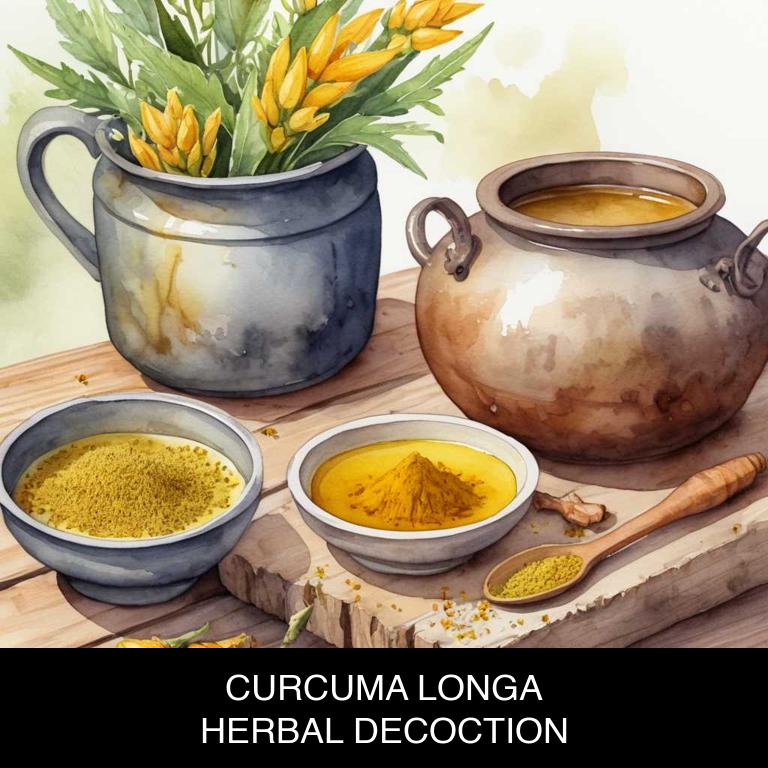
Medicinal Constituents
The list below shows the primary medicinal constituents in Curcuma longa decoctions that help with inflammatory bowel disease.
- Curcumin: It helps reduce inflammation and oxidative stress in the gut by inhibiting the activity of pro-inflammatory enzymes, such as cyclooxygenase-2 (COX-2) and lipoxygenase (LOX), which contribute to the pathogenesis of inflammatory bowel disease.
- Demethoxycurcumin: It exhibits potent anti-inflammatory and antioxidant properties, which help reduce the severity of gut inflammation by scavenging free radicals and inhibiting the production of pro-inflammatory cytokines.
- Turmerone: It has been shown to possess anti-inflammatory and immunomodulatory effects, which help regulate the immune response and reduce inflammation in the gut by inhibiting the activation of immune cells, such as macrophages and T lymphocytes.
Parts Used
The list below shows the primary parts of turmeric used to make decoctions for inflammatory bowel disease.
- Rhyzomes: They contain high concentrations of curcumin, a potent anti-inflammatory compound that helps alleviate symptoms of inflammatory bowel disease.
- Roots: The roots of Curcuma longa contain curcuminoids, which have been shown to reduce inflammation and oxidative stress in the gut, making them beneficial for inflammatory bowel disease.
- Seeds: Although less commonly used, the seeds of Curcuma longa may also be used to prepare decoctions for inflammatory bowel disease, possibly due to their content of bioactive compounds that contribute to the plant's anti-inflammatory properties.
Quick Recipe
The following recipe gives a procedure to make a basic turmeric for inflammatory bowel disease.
- Rinse 1-2 teaspoons of dried curcuma longa roots under cold water for a minute.
- Boil 2 cups of water in a saucepan over high heat for 5 minutes.
- Add the rinsed curcuma longa roots to the boiling water and let it simmer for 10 minutes.
- Strain the decoction through a cheesecloth or a fine-mesh sieve into a cup.
- Discard the solids and let the decoction cool down to room temperature for 30 minutes.
2. Zingiber officinale
Ginger decoctions helps with inflammatory bowel disease because it possesses anti-inflammatory compounds like gingerol and shogaol, which inhibit pro-inflammatory enzymes and reduce inflammation in the gut.
The decoction's active ingredients also improve digestion and relieve symptoms of irritable bowel syndrome (IBS) such as bloating, cramping, and diarrhea.
Additionally, ginger has been shown to increase mucus production in the intestines, which helps protect against inflammation and maintain a healthy gut lining, ultimately providing relief from inflammatory bowel disease symptoms.
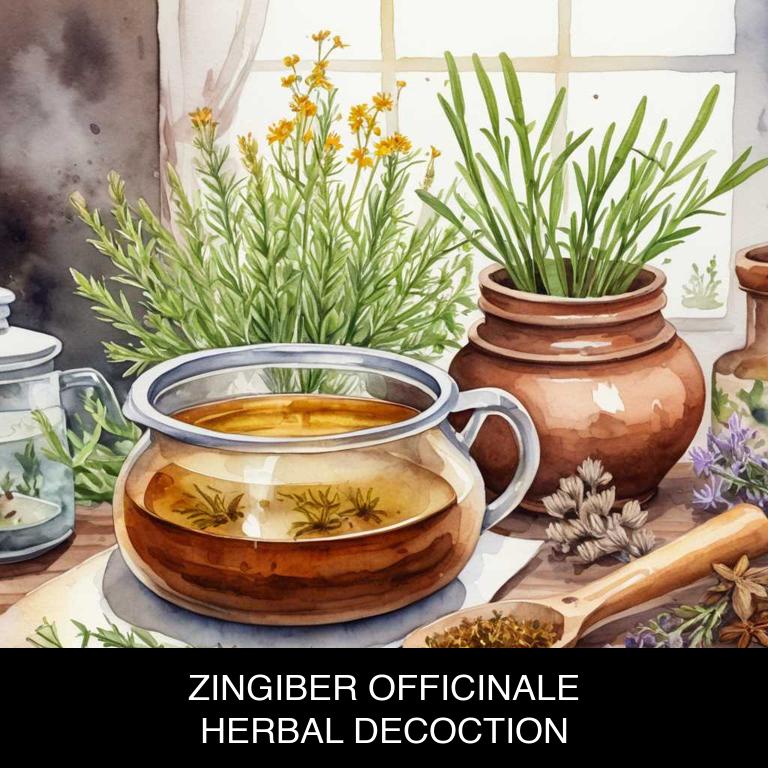
Medicinal Constituents
The list below shows the primary medicinal constituents in Zingiber officinale decoctions that help with inflammatory bowel disease.
- Gingerols: Gingerols, particularly [6]-gingerol, have potent anti-inflammatory properties that help alleviate symptoms of inflammatory bowel disease by inhibiting the production of pro-inflammatory enzymes and cytokines.
- Shogaols: Shogaols, found in higher concentrations in ginger decoctions, have been shown to exhibit anti-inflammatory and antioxidant activities, which help reduce inflammation and oxidative stress in the gut, contributing to the management of inflammatory bowel disease.
- Zingerone: Zingerone, a derivative of gingerols, has been found to possess anti-inflammatory and anti-oxidant properties, which may help mitigate the severity of inflammatory bowel disease symptoms by modulating the gut microbiome and reducing inflammation in the gastrointestinal tract.
Parts Used
The list below shows the primary parts of ginger used to make decoctions for inflammatory bowel disease.
- Roots: The roots of Zingiber officinale are also used for their ability to reduce inflammation and alleviate symptoms associated with inflammatory bowel disease.
- Stems: The stems of ginger, although less commonly used, may also be employed in decoctions due to their potential to provide similar anti-inflammatory benefits as the rhizomes and roots.
Quick Recipe
The following recipe gives a procedure to make a basic ginger for inflammatory bowel disease.
- Gather 1-2 teaspoons of dried zingiber officinale root and 2 cups of boiling water.
- Combine the dried root with the boiling water and let it steep for 5-7 minutes.
- Strain the mixture through a cheesecloth or fine-mesh sieve into a cup.
- Discard the solids and let the decoction cool to room temperature for 10-15 minutes.
- Store the cooled decoction in a sealed container in the refrigerator for up to 24 hours.
3. Ulmus rubra
Slippery elm decoctions helps with inflammatory bowel disease because it provides a soothing, protective barrier to the mucous membranes of the gastrointestinal tract.
The mucilage extracted from the slippery elm plant forms a gel-like substance that coats and shields the damaged tissue, reducing inflammation and irritation.
Additionally, its anti-inflammatory properties help to calm the immune response and promote healing, alleviating symptoms such as abdominal pain, diarrhea, and constipation associated with inflammatory bowel disease.
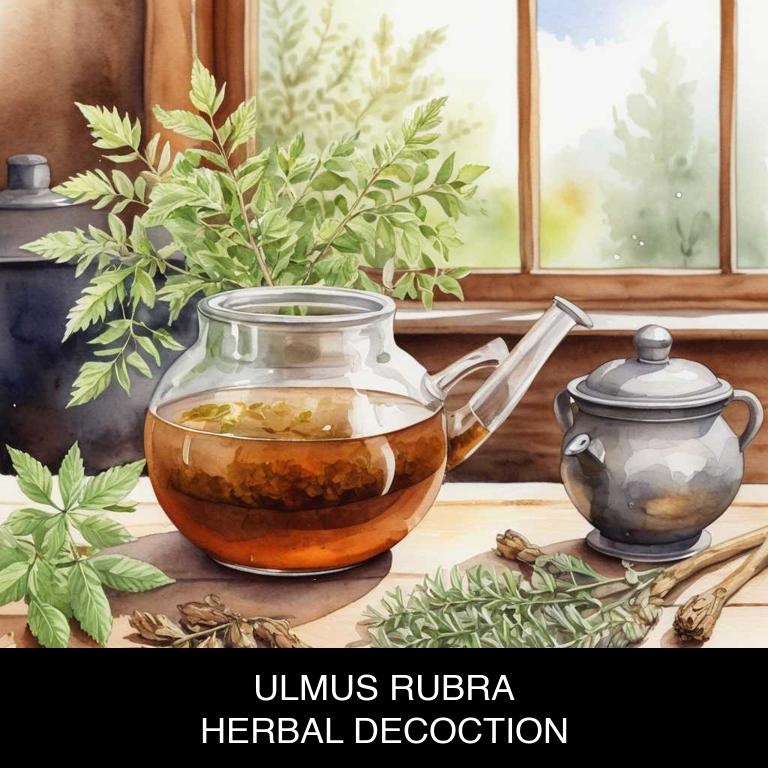
Medicinal Constituents
The list below shows the primary medicinal constituents in Ulmus rubra decoctions that help with inflammatory bowel disease.
- Phenolic acids: They have potent anti-inflammatory properties, which help reduce inflammation and oxidative stress in the gastrointestinal tract, alleviating symptoms of inflammatory bowel disease.
- Tannins: They possess anti-inflammatory and antioxidant activities, which help protect the intestinal lining from damage, reduce inflammation, and promote healing in cases of inflammatory bowel disease.
- Flavonoids: They exhibit anti-inflammatory and antioxidant properties, which help reduce inflammation, alleviate oxidative stress, and protect the intestinal lining from damage, thus providing relief from symptoms of inflammatory bowel disease.
Parts Used
The list below shows the primary parts of slippery elm used to make decoctions for inflammatory bowel disease.
- Barks: Used for its anti-inflammatory properties, which help to soothe and calm irritated bowels.
- Roots: Employed for their antioxidant and anti-inflammatory properties, which aid in reducing inflammation and promoting healing in the digestive tract.
- Leaves: Utilized for their anti-inflammatory and antimicrobial properties, which help to reduce inflammation, prevent infections, and promote overall gut health.
Quick Recipe
The following recipe gives a procedure to make a basic slippery elm for inflammatory bowel disease.
- Gather 30g of dried ulmus rubra bark, 20g of dried roots, and 10g of dried leaves.
- Combine the dried materials in a stainless steel pot with 1 liter of water.
- Boil the mixture for 5 minutes, then reduce heat to a simmer for 30 minutes.
- Strain the decoction through a cheesecloth or a fine-mesh sieve into a bowl.
- Discard the solids and store the decoction in the refrigerator for up to 3 days.
4. Glycyrrhiza glabra
Licorice decoctions helps with inflammatory bowel disease because it contains a compound called glycyrrhizin, which has potent anti-inflammatory properties.
This compound has been shown to reduce inflammation in the gut by inhibiting the production of pro-inflammatory cytokines and by scavenging free radicals. Additionally, licorice decoctions have been found to improve gut barrier function, reducing the permeability of the intestine and preventing the passage of toxins into the bloodstream.
By reducing inflammation and improving gut health, licorice decoctions may provide relief for individuals suffering from inflammatory bowel disease.

Medicinal Constituents
The list below shows the primary medicinal constituents in Glycyrrhiza glabra decoctions that help with inflammatory bowel disease.
- Licoricidin: This isoflavane glycoside has anti-inflammatory properties, which help in reducing inflammation and promoting healing in the gut.
- Licorice saponins: These triterpenoid saponins have potent anti-inflammatory and immunomodulatory effects, which help in regulating the immune response and reducing inflammation in the gut.
- Liquiritin: This flavonoid glycoside has anti-inflammatory and antioxidant properties, which help in protecting the gut mucosa from oxidative damage and reducing inflammation.
Parts Used
The list below shows the primary parts of licorice used to make decoctions for inflammatory bowel disease.
- Roots: Roots of Glycyrrhiza glabra are commonly used to make decoctions for inflammatory bowel disease due to their rich content of glycyrrhizin, a compound with anti-inflammatory properties.
- Roots: Roots are also used for their licorice-like flavor and ability to soothe digestive issues.
- Roots: Additionally, roots contain flavonoids and saponins that help reduce inflammation and promote healing in the gut.
Quick Recipe
The following recipe gives a procedure to make a basic licorice for inflammatory bowel disease.
- Harvest 100g of dried glycyrrhiza glabra roots or 200g of fresh roots.
- Cut the roots into small pieces to increase their surface area for better extraction.
- Combine the cut roots with 1l of cold water in a saucepan and bring to a boil.
- Reduce heat to a simmer and let the decoction steep for 10-15 minutes.
- Strain the decoction through a cheesecloth or a fine-mesh sieve into a clean container.
5. Althaea officinalis
Marshmallow decoctions helps with inflammatory bowel disease because they possess anti-inflammatory properties that soothe and protect the mucous membranes in the digestive tract.
The saponins present in marshmallow root have been shown to reduce inflammation, swelling, and pain associated with conditions such as Crohn's disease and ulcerative colitis. By reducing inflammation, marshmallow decoctions can help alleviate symptoms of irritable bowel syndrome (IBS), including abdominal pain, bloating, and diarrhea.
Additionally, they can promote healing and repair of the intestinal lining, promoting a healthy gut microbiome.
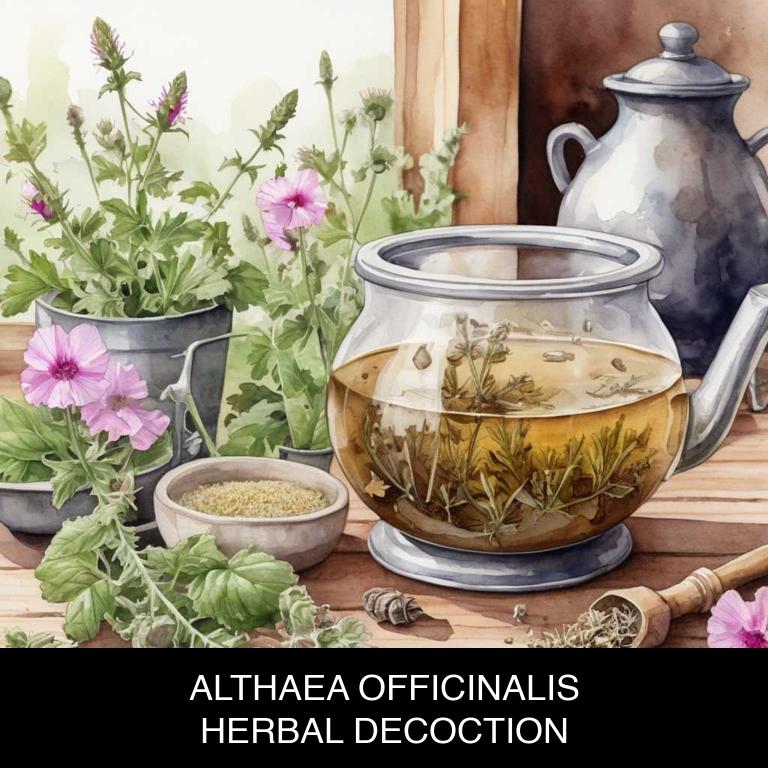
Medicinal Constituents
The list below shows the primary medicinal constituents in Althaea officinalis decoctions that help with inflammatory bowel disease.
- Mucilages: Mucilages help soothe and protect the mucous membranes in the gut, reducing inflammation and irritation associated with inflammatory bowel disease.
- Polysaccharides: Polysaccharides, such as arabinogalactan, have anti-inflammatory properties and may help regulate the gut microbiome, reducing symptoms of inflammatory bowel disease.
- Flavonoids: Flavonoids, such as kaempferol and quercetin, have potent anti-inflammatory and antioxidant properties, which may help reduce oxidative stress and inflammation in the gut associated with inflammatory bowel disease.
Parts Used
The list below shows the primary parts of marshmallow used to make decoctions for inflammatory bowel disease.
- Roots: They contain mucilages, which help to soothe and protect the mucous membranes in the digestive tract.
- Leaves: They are also rich in mucilages, contributing to their anti-inflammatory and soothing effects.
- Barks: They are used due to their high content of mucilages and flavonoids, which help to reduce inflammation and promote healing.
Quick Recipe
The following recipe gives a procedure to make a basic marshmallow for inflammatory bowel disease.
- Harvest 2-4 ounces of dried root of althaea officinalis from a trusted source to ensure freshness.
- Boil 2 cups of water in a saucepan over medium heat for approximately 10 minutes.
- Add the dried root to the boiling water and continue boiling for 5-7 minutes.
- Reduce heat to low and let the decoction simmer for 10-15 minutes with the lid on.
- Strain the decoction through a cheesecloth or fine mesh into a clean glass container.
6. Boswellia serrata
Frankincense decoctions helps with inflammatory bowel disease because of its potent anti-inflammatory and antioxidant properties.
The boswellic acids present in frankincense have been shown to inhibit the production of pro-inflammatory compounds, reducing inflammation and oxidative stress in the gut. This can help alleviate symptoms such as abdominal pain, diarrhea, and bloating commonly associated with conditions like ulcerative colitis and Crohn's disease.
By promoting healing and reducing inflammation, frankincense decoctions may provide relief for individuals suffering from inflammatory bowel disease.
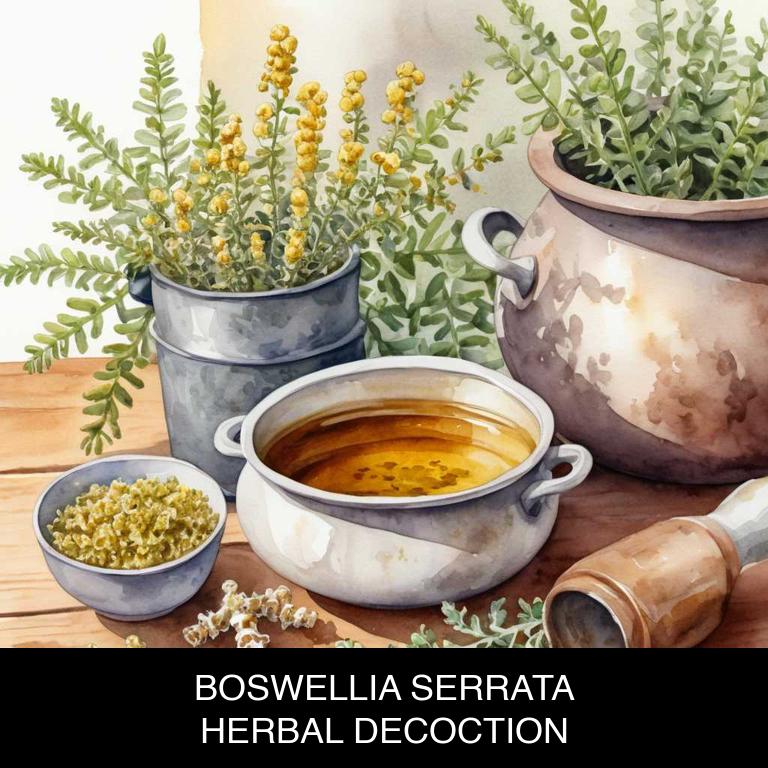
Medicinal Constituents
The list below shows the primary medicinal constituents in Boswellia serrata decoctions that help with inflammatory bowel disease.
- Acetyl-11-keto-β-boswellic acid: This triterpene derivative helps with inflammatory bowel disease by inhibiting the production of pro-inflammatory cytokines and enzymes, thereby reducing inflammation and promoting healing.
- Β-boswellic acids: These pentacyclic triterpenes have anti-inflammatory properties, which help alleviate symptoms of inflammatory bowel disease by inhibiting the activity of pro-inflammatory enzymes and cytokines.
- 3-acetyl-11-keto-β-boswellic acid methyl ester: This compound has been shown to exhibit potent anti-inflammatory and antioxidant activities, which help protect against oxidative stress and inflammation in the gut, thereby providing relief from symptoms of inflammatory bowel disease.
Parts Used
The list below shows the primary parts of frankincense used to make decoctions for inflammatory bowel disease.
- Roots: Roots: The primary part used for medicinal purposes, containing boswellic acids responsible for anti-inflammatory properties.
- Barks: Barks: Used as a secondary part, containing similar boswellic acids as the roots, but with a slightly different composition.
- Stems: Stems: Utilized for decoctions, containing some boswellic acids, although in lesser amounts compared to roots and barks.
Quick Recipe
The following recipe gives a procedure to make a basic frankincense for inflammatory bowel disease.
- Grind 2-3 grams of dried boswellia serrata resin into fine powder using a mortar and pestle.
- Combine the ground powder with 250-500 ml of cold water in a saucepan and heat over medium heat.
- Bring the mixture to a boil then reduce heat to low and simmer for 10-15 minutes.
- Strain the decoction through a cheesecloth or fine-mesh sieve into a clean container to remove solids.
- Allow the decoction to cool and then refrigerate it for up to 3 days or freeze for longer storage.
7. Mentha x piperita
Peppermint decoctions helps with inflammatory bowel disease because of its ability to relax the muscles in the digestive tract, reducing spasms and cramps associated with irritable bowel syndrome (IBS) and inflammatory bowel disease (IBD).
The decoction's anti-inflammatory properties also help to reduce inflammation and swelling in the gut, which can alleviate symptoms such as abdominal pain, bloating, and diarrhea.
Additionally, peppermint's natural soothing effects can calm irritated mucous membranes, promoting healing and reducing inflammation in the gut lining.
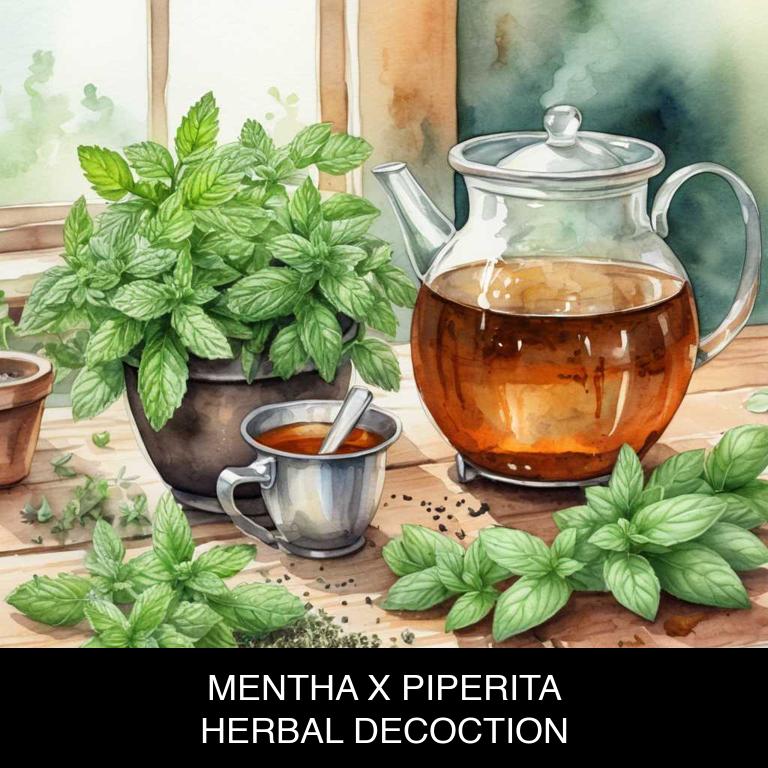
Medicinal Constituents
The list below shows the primary medicinal constituents in Mentha x piperita decoctions that help with inflammatory bowel disease.
- Rosmarinic acid: A polyphenolic compound that helps reduce inflammation and oxidative stress in the gut, thus alleviating symptoms of inflammatory bowel disease.
- Menthol: A terpene that has anti-inflammatory and antimicrobial properties, which can help soothe the gut lining, reduce inflammation, and prevent bacterial overgrowth associated with IBD.
- Limonene: A monoterpene that has anti-inflammatory and immunomodulatory effects, which can help reduce inflammation and modulate the immune response in the gut, thereby alleviating symptoms of IBD.
Parts Used
The list below shows the primary parts of peppermint used to make decoctions for inflammatory bowel disease.
- Leaves: The leaves are the most commonly used part due to their high concentration of essential oils, particularly menthol and menthone, which have anti-inflammatory properties.
- Stems: The stems of Mentha x piperita contain a significant amount of menthol and menthone, making them a popular choice for decoctions to help manage inflammatory bowel disease symptoms.
- Roots: The roots of the plant are also used to make decoctions for inflammatory bowel disease, as they contain a higher concentration of menthol and menthone compared to the stems and leaves.
Quick Recipe
The following recipe gives a procedure to make a basic peppermint for inflammatory bowel disease.
- Harvest 1/4 cup of fresh mentha x piperita leaves and stems at peak potency usually in summer.
- Clean the harvested plant material by gently brushing off dirt with a soft-bristled brush.
- Combine the cleaned plant material with 2 cups of boiling water in a heat-resistant container.
- Steep the mixture for 5-7 minutes to allow the volatile oils to infuse into the water.
- Strain the decoction through a fine-mesh sieve into a clean container discarding the solids.
8. Ginkgo biloba
Maidenhair tree decoctions helps with inflammatory bowel disease because of its rich antioxidant properties, which help reduce inflammation in the digestive tract.
The decoction's flavonoids and polyphenols work to neutralize free radicals, thereby protecting the gut lining from oxidative damage. Additionally, the anti-inflammatory compounds present in maidenhair tree decoctions, such as ursolic acid, have been shown to inhibit pro-inflammatory cytokines, alleviating symptoms of inflammatory bowel disease (IBD) like diarrhea, abdominal pain, and weight loss.
This natural remedy has been used for centuries to soothe digestive issues and may provide relief from IBD symptoms.
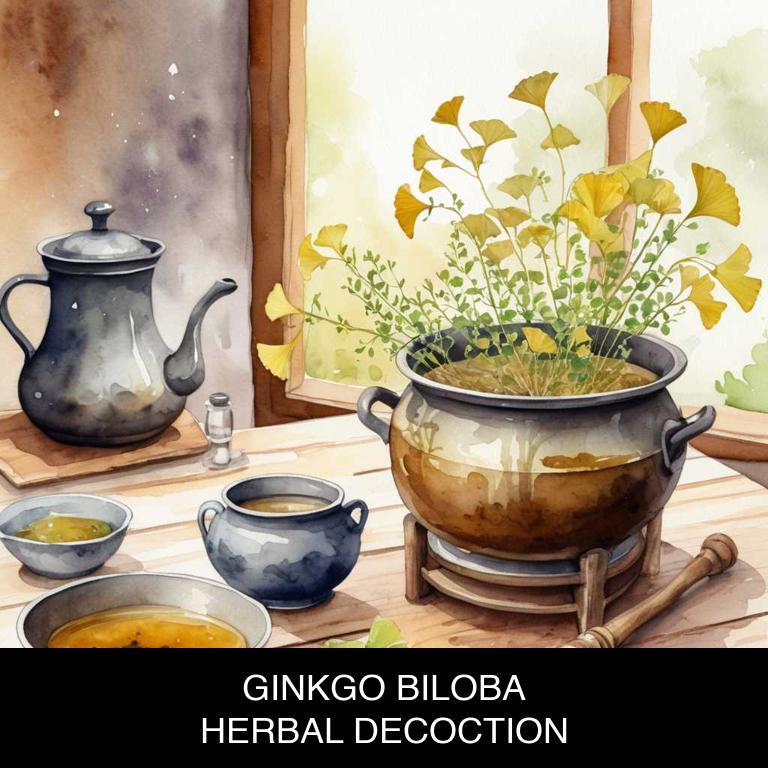
Medicinal Constituents
The list below shows the primary medicinal constituents in Ginkgo biloba decoctions that help with inflammatory bowel disease.
- Bilobalide: This sesquiterpene lactone may help with IBD by reducing inflammation and oxidative stress in the gut, thereby alleviating symptoms such as diarrhea and abdominal pain.
- Quercetin: As a flavonoid and potent antioxidant, quercetin may help mitigate IBD symptoms by reducing inflammation, modulating the immune response, and protecting against gut barrier damage.
- Ginkgolide b: This sesquiterpene may help with IBD by inhibiting platelet-activating factor (PAF), a pro-inflammatory mediator that contributes to the development of IBD symptoms, such as inflammation and tissue damage.
Parts Used
The list below shows the primary parts of maidenhair tree used to make decoctions for inflammatory bowel disease.
- Leaves: They are the most commonly used part due to their high content of flavonoids and terpenoids, which have anti-inflammatory properties.
- Seeds: The seeds are rich in bilobalide and ginkgolides, which have anti-inflammatory and antioxidant effects that can help alleviate inflammatory bowel disease symptoms.
- Barks: The barks contain flavonoids and terpenoids that exhibit anti-inflammatory and antioxidant properties, making them useful for treating inflammatory bowel disease.
Quick Recipe
The following recipe gives a procedure to make a basic maidenhair tree for inflammatory bowel disease.
- Harvest 20-30 fresh ginkgo biloba leaves and clean them thoroughly with cold water to remove dirt and debris.
- Chop the ginkgo biloba leaves into small pieces and combine with 2 cups of water in a saucepan.
- Bring the mixture to a boil and reduce heat to a simmer for 10-15 minutes to allow the active compounds to release.
- Strain the decoction using a cheesecloth or a fine-mesh sieve into a separate container to remove the solids.
- Store the ginkgo biloba decoction in the refrigerator for up to 3 days or freeze it for later use.
9. Taraxacum officinale
Dandelion decoctions helps with inflammatory bowel disease because of its potent anti-inflammatory and antioxidant properties.
The bioactive compounds in dandelion, such as taraxasterol and chicoric acid, have been shown to inhibit the production of pro-inflammatory cytokines, reducing inflammation in the gut.
Additionally, dandelion's prebiotic fiber content helps promote the growth of beneficial gut bacteria, restoring balance to the microbiome and alleviating symptoms associated with inflammatory bowel disease, such as abdominal pain, diarrhea, and fatigue.

Medicinal Constituents
The list below shows the primary medicinal constituents in Taraxacum officinale decoctions that help with inflammatory bowel disease.
- Flavonoids: Flavonoids, especially quercetin, help reduce inflammation in the gut by inhibiting pro-inflammatory enzymes and promoting the production of anti-inflammatory cytokines.
- Taraxasterol: Taraxasterol, a triterpenoid saponin, exhibits anti-inflammatory and antioxidant properties, which may help reduce oxidative stress and inflammation in the gut lining, alleviating symptoms of inflammatory bowel disease.
- Kaempferol glycosides: Kaempferol glycosides, a type of flavonoid, have been shown to possess anti-inflammatory and immunomodulatory effects, which may help regulate the immune response and reduce inflammation in the gut, thereby providing relief from inflammatory bowel disease symptoms.
Parts Used
The list below shows the primary parts of dandelion used to make decoctions for inflammatory bowel disease.
- Leaves: The leaves are used due to their high concentration of taraxasterol and other bioactive compounds that may help reduce inflammation.
- Roots: The roots are used because they contain taraxasterol and other saponins, which have anti-inflammatory and immunomodulatory properties that may help alleviate symptoms of inflammatory bowel disease.
- Stems: The stems are used due to their content of taraxasterol and other flavonoids, which may help reduce inflammation and promote healing in the gut.
Quick Recipe
The following recipe gives a procedure to make a basic dandelion for inflammatory bowel disease.
- Harvest 10 to 20 fresh taraxacum officinale leaves and roots in the early morning for optimal potency.
- Chop the taraxacum officinale leaves and roots into small pieces to release their active compounds.
- Combine 1 part of chopped taraxacum officinale with 4 parts of boiling water in a saucepan.
- Simmer the taraxacum officinale decoction over low heat for 10 to 20 minutes to infuse the water.
- Strain the taraxacum officinale decoction through a cheesecloth or a fine-mesh sieve into a clean container.
10. Aloe vera
Aloe decoctions helps with inflammatory bowel disease because of its unique ability to reduce inflammation and promote healing in the gastrointestinal tract.
The aloe vera plant contains bioactive compounds such as aloin and aloe-emodin, which have been shown to possess anti-inflammatory properties that can help alleviate symptoms of inflammatory bowel disease (IBD) such as abdominal pain, diarrhea, and constipation.
By reducing inflammation, aloe decoctions may also help restore the integrity of the gut lining and promote a healthy balance of gut bacteria, leading to improved overall digestive health.
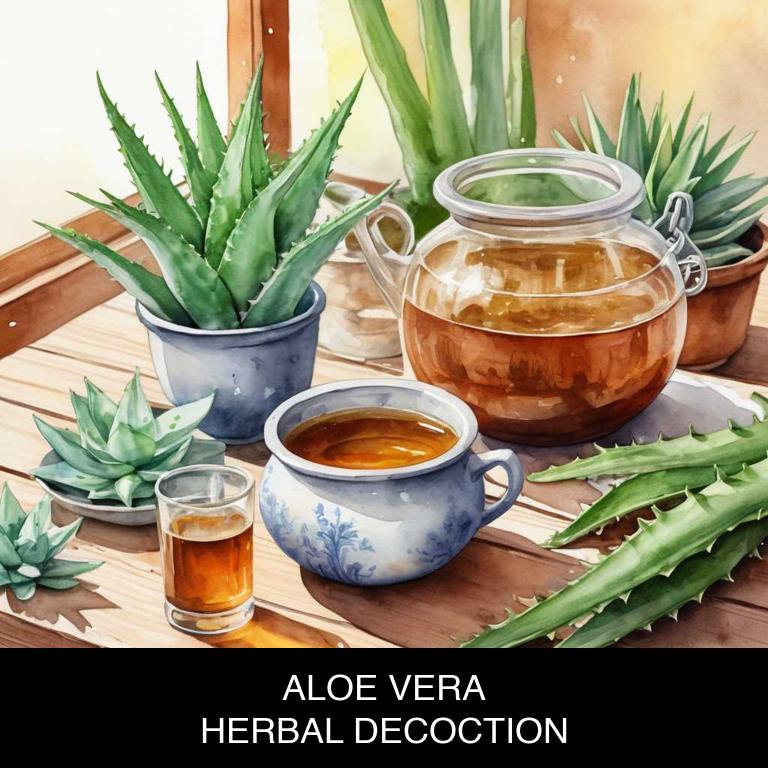
Medicinal Constituents
The list below shows the primary medicinal constituents in Aloe vera decoctions that help with inflammatory bowel disease.
- Aloe-emodin: Aloe-emodin, a anthraquinone compound, helps with inflammatory bowel disease by reducing inflammation and inhibiting the production of pro-inflammatory cytokines, which contribute to the disease's progression.
- Aloe barbadensis polysaccharides: Aloe barbadensis polysaccharides, also known as acemannan, help with inflammatory bowel disease by stimulating the immune system and increasing the production of anti-inflammatory cytokines, which help to reduce inflammation and promote healing.
- Brayssonin: Brayssonin, a phenolic compound, helps with inflammatory bowel disease by exhibiting anti-inflammatory and antioxidant properties, which help to reduce oxidative stress and inflammation in the gut, promoting healing and tissue repair.
Parts Used
The list below shows the primary parts of aloe used to make decoctions for inflammatory bowel disease.
- Leaves: The most used part of Aloe vera for inflammatory bowel disease is the gel extracted from its leaves, which is rich in anti-inflammatory compounds and soothing properties.
- Roots: The roots of Aloe vera contain various bioactive compounds like polysaccharides and glycoproteins, which have been shown to possess anti-inflammatory and immunomodulatory effects, helping in managing inflammatory bowel disease.
Quick Recipe
The following recipe gives a procedure to make a basic aloe for inflammatory bowel disease.
- Gather 1-2 inches of fresh aloe vera gel from 3-4 aloe vera leaves and rinse thoroughly with water.
- Chop the aloe vera gel into small pieces and transfer it to a medium-sized saucepan with 2 cups water.
- Bring the mixture to a boil over high heat then reduce the heat to medium-low and simmer for 10-15 minutes.
- Strain the decoction through a cheesecloth or fine-mesh sieve into a clean glass container to remove solids.
- Allow the decoction to cool completely before transferring it to a glass bottle and store it in the refrigerator.
What is the best combination of herbal decoctions to use for inflammatory bowel disease?
The best combination of herbal decoctions that help with inflammatory bowel disease is a blend of Slippery Elm, Marshmallow Root, and Licorice Root.
Slippery Elm soothes and protects the gut lining, while Marshmallow Root reduces inflammation and promotes healing. Licorice Root has anti-inflammatory properties that help to calm the digestive system.
This combination works synergistically to reduce inflammation, promote healing, and support the gut's natural barrier function, providing relief from symptoms of inflammatory bowel disease such as diarrhea, abdominal pain, and weight loss.
What ailments similar to inflammatory bowel disease are treated with herbal decoctions?
Ailments similar to inflammatory bowel disease that are treated with herbal decoctions are conditions such as irritable bowel syndrome (IBS), gastritis, and colitis.
Decoctions made from herbs like turmeric, ginger, and licorice root have anti-inflammatory properties that can help soothe digestive issues and reduce symptoms like abdominal pain, bloating, and diarrhea.